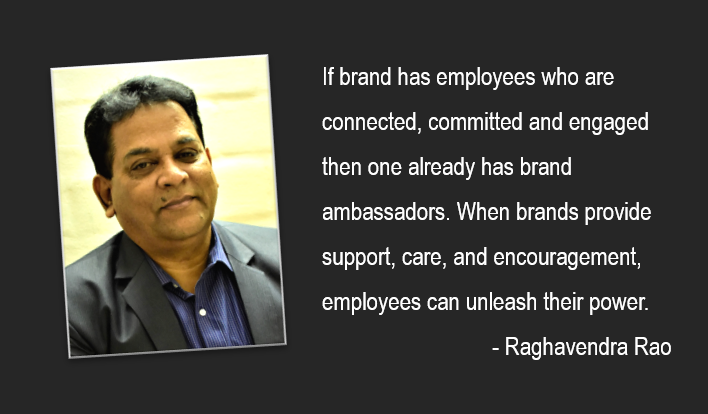“Every employee is a PR ambassador” wonder how many corporates or even PR consultancy heads know of this. Large corporate with a strong HR wing always promote this culture and it has also come to light that many HR departments conduct training sessions with their employees and build a bond of ownership with employees. It is also noticed that many large corporate houses take their exit interviews seriously and also try to diffuse any grave concerns the leaving employee has. By doing this they also ensure that the exiting employee doesn’t spread negativity around the brand.
Hurting a brand is the easiest thing to do in today’s world as there are various social media opportunities and even job aggregators have created a response mechanism based on the experience as per the profile submitted. I must mention here that the moment one updates the profile, aggregators ask for the rating of previous job which also ensures the confidentiality of the person who submits the feedback.
However the role of an employee whose product or service has higher public exposure is far too challenging. Take the case of mobile service provider, airline industry, network service provider, mobile manufacturer, auto manufacturer and the likes. Since the employees here interact with public directly too often it is the bound duty of the corporate to ensure that the employees are trained appropriately and cause lesser damage to brand if any through their interactions.
Although company employees will have a perceived bias for their company’s product or service, employee brand ambassadors from outside the sales and marketing teams will come across as providing a more authentic point of view. Additionally, their willingness to endorse a product and personally vouch for an organisation validates the brand.
When cultivating employee support and advocacy on behalf of your brand through a formal employee brand ambassador program, the extra training provided to brand ambassadors—including ensuring they are kept up to date on the latest content and product enhancements—can benefit established customers as well as prospective clients.
With such training program effort must also be made to ensure that there is a sense of ownership built within the employees and they are true in their expression towards a brand and not farcical. Even the acts of the management towards the employee/s must be such that there is a sense of belongingness towards a brand.
Largely every management sends a message repeatedly stressing as to how people are our greatest asset. Here the argument stands, in the context of an organisation’s own internal communications, if its people are indeed their greatest asset, why do so few companies seriously investing in its internal communications for their employees?
Do we not want every employee to become public relations and brand ambassador for the organisation? A PR ambassador is, in the sense of a “believer,” very committed and proudly socialising all the success stories and achievements of your organisation. Seldom does organisation create such a platform for employees. Many a time it is the “ego” of the HR lead, or promoter, or the CEO which comes in way to block this premise.
On the HR side of the business many have realised, for some time now, that their employees are all, quite naturally, brand ambassadors. The members of the workforce identify with a company merely by being a part of the organisation. If one does a fact check there may be hundreds or thousands of employees who are sharing their stories, discussing their careers, and promoting the employment experience—amplified across numerous social media channels—with their unique and individual voices. Now that’s powerful.
Honesty and authenticity are important so make sure that brand champions also understand their personal brands. Every employee has individual traits that make them unique and exceptional and, when allowed to speak with a ‘personal’ voice, can imbue the story of any company with realness and humanity. Allowing the employees to share what inspires them and makes their employment experience exceptional not only solidifies their own engagement with the brand but can also boost the organisation talent attraction activities.
If brand has employees who are connected, committed, and engaged then one already has brand ambassadors. When brands provide support, care, and encouragement employees can unleash their power. The implications of communication and engagement within the organisation will sooner or later exert an extraordinary impact on the bottom line.
Easier said than done. To do so we must try to answer the main question: Does your organisation’s vision and mission penetrate to all levels of the workforce. Is everyone able to articulate with pride and display motivation to become a PR and brand ambassador of the company?
Employee Advocacy can be defined as employees sharing their support for a company’s practiced values and ethics, policies and processes. They are firmly optimistic about the company, endorse the company as great place to work, passionate about protecting, safeguarding and implementing its values within and outside the organisation. They are perceived to be visible in their commitment to their organisation, customer and organisational values. Jason Spencer, Community Manager from Humana describes employee advocacy as “empowering and enabling employees to tell our story as a brand”. “Dynamic signal and our social lounge has involved our employees in a way that’s fun and exciting for them. It is a way for them to share who they are” – said Dennis Owen (Cathay Pacific). Employees are engaging in activities with no intention of promoting their organisation. Employee advocacy refers to the exposure that a company’s staff generates for the brand using their own social channels. This opportunity to gain increase social share of voice and online visibility of a business is often overlooked by organisations, choosing instead to focus on exposure from third-party sources.



Be the first to comment on "PR Ambassadors – A Myth"